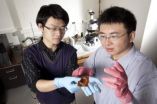Researchers said patients' willingness to undergo tests bodes well for the future of personalized medicine, in which specific treatments are prescribed depending on the DNA genetic makeup of patients' tumors.
"This is the first study of its kind where patients themselves were asked what tests and medical imaging studies they would be willing to undergo while participating in clinical studies for their cancer. Patients also were asked how invasive they perceived such tests and studies," said Raoul Tibes, M.D. Ph.D., lead author of the study recently published online by the prestigious scientific journal Cancer, a physician-scientist for the Mayo Clinic in Arizona.
The study, Patient willingness to undergo pharmacodynamic and pharmacokinetic tests in early phase oncology trials, is scheduled for print publication in the July 15, 2011, edition of Cancer, published by the American Cancer Society.
To learn and understand more about the molecular aspects of cancer, researchers need tumor samples and images from tests like computed tomography (CAT) scans, magnetic resonance imaging (MRIs), positron emission tomography (PET) scans and other tests. Early-phase clinical trials involve analyses of pharmacodynamics (what the drug does to the body) and pharmacokinetics (what the body does to a drug). The authors conducted a prospective study, examining patients' willingness to undergo such tests and the number of tests the patients would tolerate.
"What we learned is that patients are, in general, very willing to undergo additional, extra tests to participate in clinical studies," said Dr. Tibes, a former research doctor for TGen Clinical Research Service, a clinical-trials partnership of TGen and Scottsdale Healthcare at the Virginia G. Piper Cancer Center in Scottsdale.
"This study will provide valuable information, collected from actual patients, thereby informing clinical investigations in an era where we have more and more molecular-targeted therapies available, and our studies are more and more complex," Dr. Tibes said.
The study included 61 patients — 22 women and 39 men — with advanced malignancies.
The overall willingness to undergo study-required tests was very high, the study found. Patients were most willing to undergo urine, blood, ultrasound, x-rays, echocardiogram, PET and CAT scan studies. They were least willing to undergo tumor and skin biopsies and MRIs. However, most patients were at lest wiling to give one tumor biopsy sample per study, and often two.
"This is important information, because it tells us that we can design clinical studies that ask patients to give extra tumor biopsies. But we need to carefully judge of how many biopsies we request and what molecular tests we do with the tumor sample," said Mitesh J. Borad, M.D., Associate Director of Phase I Drug Development at the Mayo Clinic in Arizona and the study's senior author.
Inconvenience and prior negative experiences for more invasive tests, such as skin biopsies, modestly affected patients' willingness to undergo these tests again, the study found. Those patients with college educations and insurance coverage were more willing to undergo tests.
Dr. Tibes, who also is Associate Director of Mayo Clinic's Acute and Chronic Leukemia Program, said the study could serve as the basis of further exploration toward the design of patient-friendly, biomarker-driven clinical studies involving cancer.
"We're taking those results forward," said Dr. Tibes, emphasizing the need for similar patient-oriented research, and to clearly communicate and educate patients about their treatment, including the goals of clinical research. "I think we need to hear it from the patients: 'This is what I'm willing to tolerate.' I think we need to ask patients more. It is crucially important."
###
About Mayo Clinic
Mayo Clinic is the first and largest integrated, not-for-profit group practice in the world. Doctors from every medical specialty work together to care for patients, joined by common systems and a philosophy of "the needs of the patient come first." More than 3,700 physicians, scientists and researchers, and 50,100 allied health staff work at Mayo Clinic, which has campuses in Rochester, Minn.; Jacksonville, Fla.; and Scottsdale/Phoenix, Ariz.; and community-based providers in more than 70 locations in southern Minnesota, western Wisconsin and northeast Iowa. These locations treat more than half a million people each year. Mayo Clinic Cancer Center is one of 40 U.S. medical centers that have been named as a National Cancer Institute (NCI) Comprehensive Cancer Center and the only national, multi-site center with the designation. To obtain the latest news releases from Mayo Clinic, go to www.mayoclinic.org/news. For information about research and education, visit www.mayo.edu. MayoClinic.com (www.mayoclinic.com) is available as a resource for your health stories.
Press Contact:
Jim McVeigh
Mayo Clinic Public Affairs
480-301-4368
mcveigh.jim@mayo.edu
About the Virginia G. Piper Cancer Center at Scottsdale Healthcare
The Virginia G. Piper Cancer Center at Scottsdale Healthcare offers diagnosis, treatment, research, prevention and support in its facilities at the Scottsdale Healthcare Shea Medical Center, attracting patients from across Arizona and the U.S. Groundbreaking cancer research is conducted through its Scottsdale Healthcare Research Institute in collaboration with TGen and leading universities. Scottsdale Healthcare is the not-for-profit parent organization of the Scottsdale Healthcare Shea Medical Center, Scottsdale Healthcare Osborn Medical Center and Scottsdale Healthcare Thompson Peak Hospital, Virginia G. Piper Cancer Center, Scottsdale Healthcare Research Institute and Scottsdale Healthcare Foundation. For additional information, please visit www.shc.org.
Press Contact:
Keith Jones, Director of Public Relations
Virginia G. Piper Cancer Center at Scottsdale Healthcare
480-882-4412
kjones@shc.org
About TGen
The Translational Genomics Research Institute (TGen) is a Phoenix, Arizona-based non-profit organization dedicated to conducting groundbreaking research with life changing results. Research at TGen is focused on helping patients with diseases such as cancer, neurological disorders and diabetes. TGen is on the cutting edge of translational research where investigators are able to unravel the genetic components of common and complex diseases. Working with collaborators in the scientific and medical communities, TGen believes it can make a substantial contribution to the efficiency and effectiveness of the translational process. TGen is affiliated with the Van Andel Research Institute in Grand Rapids, Michigan. For more information, visit: www.tgen.org.
Press Contact:
Steve Yozwiak
TGen Senior Science Writer
602-343-8704
syozwiak@tgen.org
END

